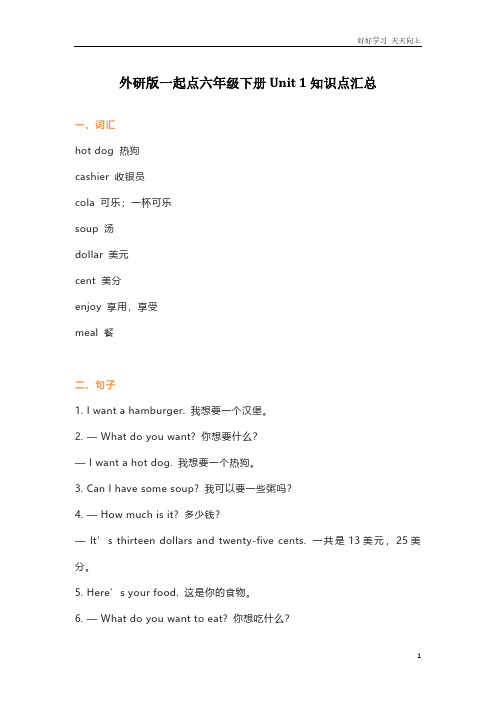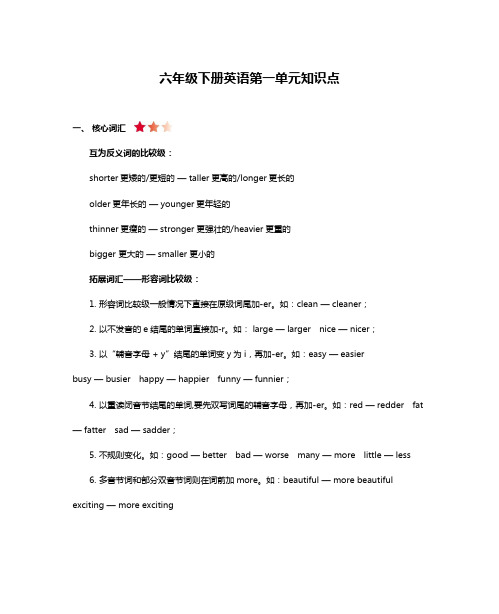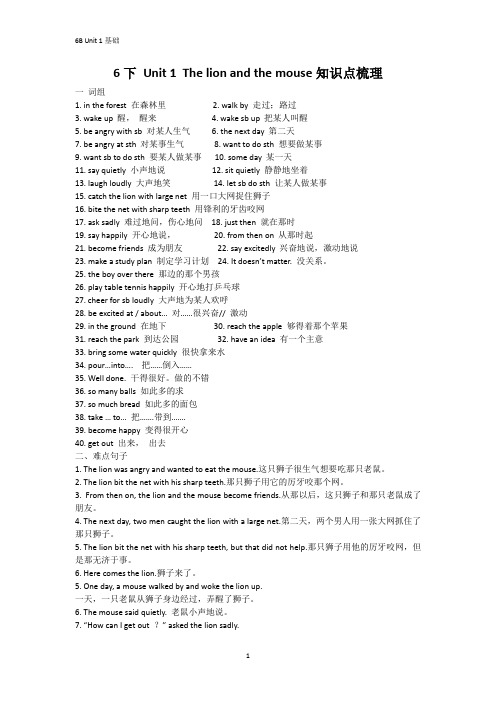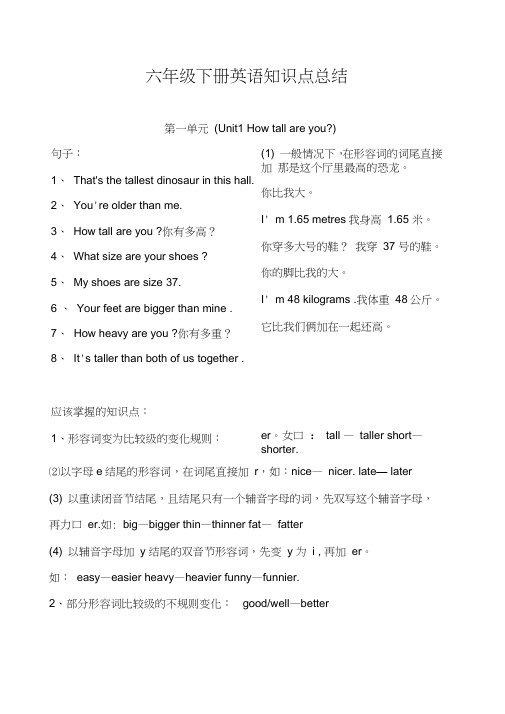英语六年级下第一单元知识点
英语六年级下册第一单元知识点

英语六年级下册第一单元知识点English: In the first unit of the sixth-grade English textbook, students typically learn about various topics such as introducing oneself, talking about hobbies, describing family members, discussing daily routines, and expressing likes and dislikes. They are introduced to new vocabulary related to these themes, along with grammar points such as present simple tense, possessive adjectives, basic prepositions of place and time, and question forms. Reading passages and dialogues are provided to reinforce comprehension skills, and students are encouraged to engage in speaking activities to practice their oral communication. Additionally, they may learn about cultural aspects related to English-speaking countries, fostering a broader understanding of the language and its context. Throughout the unit, students engage in activities that promote listening, speaking, reading, and writing skills, aiming for comprehensive language acquisition.中文翻译: 在六年级英语教科书的第一单元中,学生通常会学习各种主题,如自我介绍,谈论爱好,描述家庭成员,讨论日常作息,以及表达喜好和不喜欢。
PEP英语六年级下册 Unit 1单元知识梳理

新版PEP六年级英语下册Unit 1知识点归纳一、必背词汇tall ------ taller 高的----更高的dinosaur 恐龙short ------ shorter 矮的/短的----更矮的/更短的hall 大厅long ------ longer 长的----更长的than 比strong------ stronger 强壮的----更强壮的both 两个都old ------ older 老的/旧的----更老的/更旧的meter 米形容词young------ younger 年轻的----更年轻的kilogram千克;公斤adj. small------ small 小的----更小的others size 号码thin ------ thinner 瘦的----更瘦的feet 脚heavy------heavier 重点----更重的wear 穿low------ lower 低地----更低地countryside乡村smart------smarter 聪明的----更聪明的shadow 影子;阴影become变成;开始变得辅+元+辅--------双写最后一个辅音字母+er辅音字母+y -----改y为i +erbig-----bigger 大的-----更大的happy-----happier 开心的-----更开心的thin-----thinner 瘦的-----更瘦的heavy-----heavier 重的------更重的fat-----fatter 胖的------更胖的funny-----funnier 滑稽的------更滑稽的二、重点句型⑴问年龄,身高,体重等How old are you? How tall are you? How heavy are you?---- I’m _______ (years old). ---- I’m ______metres tall. ---- I’m ______ kilograms .⑵问物品的情况:① How large is your room? 你的房间有多大?It’s __________ m2 (square meters.) 有_______ 平方米。
外研版一起点六年级下册Unit 1知识点汇总

外研版一起点六年级下册Unit 1知识点汇总一、词汇hot dog 热狗cashier 收银员cola 可乐;一杯可乐soup 汤dollar 美元cent 美分enjoy 享用,享受meal 餐二、句子1. I want a hamburger. 我想要一个汉堡。
2. — What do you want? 你想要什么?— I want a hot dog. 我想要一个热狗。
3. Can I have some soup? 我可以要一些粥吗?4. — How much is it? 多少钱?— It’s thirteen dollars and twenty-five cents. 一共是13美元,25美分。
5. Here’s your food. 这是你的食物。
6. — What do you want to eat? 你想吃什么?— I want to eat some meat. 我想吃些肉。
7. Can I help you? 我可以帮你吗?8. — What do you want to drink? 你想喝什么?— Milk, please. 请来一杯牛奶。
三、句型结构1. I want + a/ an/ some... + 名词. 表示某人想要某物。
eg: I want some eggs. 我想要一些鸡蛋。
2. What do you want to eat/ drink? 询问对方想吃/ 喝什么。
eg: — What do you want to drink? 你想喝点什么?— A cup of coffee, please. 请来一杯咖啡。
3. — How much is ...? 询问某物多少钱。
— It’s ...eg: — How much is the coat? 这个外套多少钱?— It’s one hundred yuan. 一百元。
人教版六年级下册英语第一单元知识点

六年级下册英语第一单元知识点一、核心词汇互为反义词的比较级:shorter更矮的/更短的— taller更高的/longer更长的older更年长的— younger更年轻的thinner更瘦的— stronger更强壮的/heavier更重的bigger 更大的— smaller 更小的拓展词汇——形容词比较级:1. 形容词比较级一般情况下直接在原级词尾加-er。
如:clean — cleaner;2. 以不发音的e结尾的单词直接加-r。
如: large — larger nice — nicer;3. 以“辅音字母 + y”结尾的单词变y为i,再加-er。
如:easy — easierbusy — busier happy — happier funny — funnier;4. 以重读闭音节结尾的单词,要先双写词尾的辅音字母,再加-er。
如:red — redder fat — fatter sad — sadder;5. 不规则变化。
如:good — better bad — worse many — more little — less6. 多音节词和部分双音节词则在词前加more。
如:beautiful — more beautiful exciting — more exciting二、了解词汇dinosaur恐龙hall大厅 metre米(美式英语: meter) than比 both两个都kilogram千克;公斤countryside乡村lower(low的比较级)更低地shadow阴影;影子 smarter(smart的比较级)更聪明的 become开始变得;变成三、核心句型1. — How tall are you? 你有多高?— I'm 1.64 metres. 我身高1.64米。
2. — What size are your shoes, Mike? 迈克,你穿多大号的鞋?— Size 7. 7号。
译林牛津英语六年级下册第一单元知识点复习与习题

6下Unit 1 The lion and the mouse知识点梳理一词组1. in the forest 在森林里2. walk by 走过;路过3. wake up 醒,醒来4. wake sb up 把某人叫醒5. be angry with sb 对某人生气6. the next day 第二天7. be angry at sth 对某事生气8. want to do sth 想要做某事9. want sb to do sth 要某人做某事10. some day 某一天11. say quietly 小声地说 12. sit quietly 静静地坐着13. laugh loudly 大声地笑14. let sb do sth 让某人做某事15. catch the lion with large net 用一口大网捉住狮子16. bite the net with sharp teeth 用锋利的牙齿咬网17. ask sadly 难过地问,伤心地问18. just then 就在那时19. say happily 开心地说,20. from then on 从那时起21. become friends 成为朋友22. say excitedly 兴奋地说,激动地说23. make a study plan 制定学习计划24. It doesn’t matter. 没关系。
25. the boy over there 那边的那个男孩26. play table tennis happily 开心地打乒乓球27. cheer for sb loudly 大声地为某人欢呼28. be excited at / about… 对……很兴奋// 激动29. in the ground 在地下 30. reach the apple 够得着那个苹果31. reach the park 到达公园32. have an idea 有一个主意33. bring some water quickly 很快拿来水34. pour…into….把……倒入……35. Well done. 干得很好。
(完整版)人教版六年级下册英语知识点总结

六年级下册英语知识点总结第一单元(Unit1 How tall are you?)句子:1、That's the tallest dinosaur in this hall.2、You're older than me.3、How tall are you ?你有多高?4、What size are your shoes ?5、My shoes are size 37.6 、Your feet are bigger than mine .7、How heavy are you ?你有多重?8、It's taller than both of us together .应该掌握的知识点:1、形容词变为比较级的变化规则:(1) 一般情况下,在形容词的词尾直接加那是这个厅里最高的恐龙。
你比我大。
I' m 1.65 metres我身高1.65 米。
你穿多大号的鞋?我穿37 号的鞋。
你的脚比我的大。
I' m 48 kilograms .我体重48公斤。
它比我们俩加在一起还高。
er。
女口: tall —taller short—shorter.⑵以字母e结尾的形容词,在词尾直接加r,如:nice—nicer. late— later(3) 以重读闭音节结尾,且结尾只有一个辅音字母的词,先双写这个辅音字母,再力口er.如: big—bigger thin—thinner fat—fatter(4) 以辅音字母加y 结尾的双音节形容词,先变y 为i , 再加er。
如:easy—easier heavy—heavier funny—funnier.2、部分形容词比较级的不规则变化:good/well—better3、 比较级的标志:tha n 。
弓I 导比较级的特殊疑问词: Which 。
句子结构为:Which+名词+is+形容词比较级。
比较级+and+比较级表示:越来越 ...4、 A 与 B 比较的句子结构: A+be 动词+形容词比较级 +than+B. 否定句句子结 构:A+be 动词+not+形容词比较级+than+B. —般疑问句句子结构:Be 动词+A + 形容词比较级 +than+B ?A 比B 多多少的句子结构:A+be 动词+数字+单位+形容词比较级+than+B 。
六年级下册英语书电子版译林版课堂笔记第一单元
译林版小学英语六年级下册第一单元知识点【Story time部分】课文详细解读1.in the forest在森林里rge and strong大而强壮的3.walk by走过,路过4.wake清醒,醒来–woke(动词过去式)wake up醒来动词+副词结构,注意把宾语放在动词后,wake sb.up使某人醒来5.some day某一天(用于说话时刻之后的将来某一天)6.small and weak又小又弱ugh loudly大声地笑8.let go让…走9.the next day第二天10.catch抓住-caught(动词过去式)catch the lion with a large net用一张大网抓住了狮子with此处表示方式,用…的工具,是介词而非动词with a large net用一张大网11.bit the net with his sharp teeth用他的尖牙咬这张网bite咬-bit(动词过去式)with his sharp teeth用他的尖牙12.help帮助help sb.(to)do sth.帮助某人做某事help sb.with sth.在某方面帮助某人词组举例:help me learn English=help me with my English在英语学习方面帮助我13.get out出去14.just then就在那时15.make制作-made(动词过去式)make a big hole in the net with his teeth用他的牙在网上咬了一个大洞16.from then on从那时起(过去时间标志)17.become friends变成朋友become成为,变成became(动词过去式)【Story time课文语段语法精讲】1.There was a lion in the forest.森林里有一只狮子。
该句为“There be…”句型在一般过去式中的用法was是is的过去式;后面加的名词为复数时,则需使用There were…句式。
苏教译林版英语 六年级下册 Unit 1 The lion and the mouse 知识点总结
苏教译林英语 六年级下册Unit 1 The lion and the mouse 知识点一、词汇mouse 老鼠 large 大的 strong 强大的,强壮的 quietly 小声地,安静地 weak 弱的,软弱的 loudly 大声地 net 网 bite 咬 sharp 锋利的,尖的 sadly 难过地,伤心地 soon 不久,很快 happily 开心地,高兴地 hit 打,击 cheer 欢呼 deep 深的 reach 够得着 quickly 迅速地,快地 wake…up 吵醒,叫醒 some day 某一天 walk by 走过,路过 let…go 释放,放开 the next day 第二天 just then 就在那时 from then on 从那时起 pour...into 把…倒入二.句型及语法1. There was a lion in the forest. “There be…” “某处有某物”there be 句型的就近原则:be 动词后面如果跟的是不止一种物品,就根据离它最近的近的物品选用is 或are.课程中所用的是过去式,is 的过去式是was ,are 的过去式是were 。
2. large 常指面积、范围等,可表示数和量(当它直接用于人时,可表示身体大);big 常指程度、规模、重量等,亦可指人,比较口语化。
China is a large and beautiful country. He is a big man.3. walk by “经过,走过” ,此短语中by 意为“在...旁边” I sit by the window. 我坐在窗户旁边。
4. wake… up “吵醒;叫醒”; up 为副词,如果后面接的宾语是代词,则要放在wake…up 的中间;如果后面接的宾语是名词,则放在中间或后面均可。
(1)Be quiet! Don’t wake up your father. (2)It’s late. Wake him up quickly.此类的短语还有:put…on; try…on; take…off 等。
(完整word版)PEP小学英语六年级下册第一单元知识要点.doc
Unit 1 How tall are you?一、重点词汇形容词比较级变化规则1、一般词尾直接+ ertall (高的)— ____________(更高的)short (短的、矮的)— ____________(更短的、更矮的)long (长的)— ____________(更长的)young (年轻的)— ____________(更年轻的)old (年长的)— ____________(更年长的)smaller (小的)— ____________(更小的)strong (强壮的)— ____________(更强壮的)2、以字母 e 结尾,词尾 + rnice(好的)— ____________(更好的)late(晚的)— ____________(更晚的)3、辅 +元 +辅——双写最后一个字母+ erbig (大的)— ____________(更大的)thin (瘦的)— ____________(更瘦的)fat(肥胖的)— ____________(更肥胖的)4、辅 +y ——改 y 为 i + erheavy(重的)— ____________(更重的)happy(快乐的)— ____________(更快乐的)funny(滑稽的、有趣的)—____________(更滑稽的、有趣的)其他词汇:dinosaur ________ hall ________ metre(美) meter(英) ________than________ both________ kilogram________ countryside________ low-lower ________ shadow________ smart-smarter________ become____________二、重点句型1、年How old are you?I’m ⋯How old is he/she/XXx?2、身高How tall are you?I’m ⋯How tall is he/she/XXx?3、体重How heavy are you?I ’m How heavy is he/she/XXx? years old.He/ She/ XXx is ⋯ years old.metres.He/ She/ XXx is ⋯ metres.⋯ kilograms .He/ She/ XXx is ⋯kilograms .4、鞋What size are your shoes?My shoes are size⋯I wear(穿)size ⋯What size are his/ her shoes?His/ Her shoes are size⋯He/ She wears(穿)size ⋯5、两人或两个物品行比: A 比 B 更⋯⋯A + be ( am/is/are) + than + B例: I am ____________ _________ you.我比你更重。
人教PEP版英语六年级下册Unit 1-4知识点总结(期末复习)
Unit1How tall are you?一、核心词汇互为反义词的比较级:shorter更矮的/更短的—taller更高的/longer更长的older更年长的—younger更年轻的thinner更瘦的—stronger更强壮的/heavier更重的bigger更大的—smaller更小的拓展词汇——形容词比较级:1.形容词比较级一般情况下直接在原级词尾加-er。
如:clean—cleaner;2.以不发音的e结尾的单词直接加-r。
如:large—larger nice—nicer;3.以“辅音字母+y”结尾的单词变y为i,再加-er。
如:easy—easier busy—busier happy—happier funny—funnier;4.以重读闭音节结尾的单词,要先双写词尾的辅音字母,再加-er。
如:red—redder fat—fatter sad—sadder;5.不规则变化。
如:good—better bad—worse many—more little —less6.多音节词和部分双音节词则在词前加more。
如:beautiful—more beautiful exciting—more exciting二、了解词汇dinosaur恐龙hall大厅metre米(美式英语:meter)than比both两个都kilogram千克;公斤countryside乡村lower(low的比较级)更低地shadow阴影;影子smarter(smart的比较级)更聪明的become开始变得;变成三、核心句型1.—How tall are you?你有多高?—I’m1.64metres.我身高1.64米。
2.—What size are your shoes,Mike?迈克,你穿多大号的鞋?—Size7.7号。
3.—How heavy are you?你体重多少?—I’m48kilograms.我体重48公斤。
- 1、下载文档前请自行甄别文档内容的完整性,平台不提供额外的编辑、内容补充、找答案等附加服务。
- 2、"仅部分预览"的文档,不可在线预览部分如存在完整性等问题,可反馈申请退款(可完整预览的文档不适用该条件!)。
- 3、如文档侵犯您的权益,请联系客服反馈,我们会尽快为您处理(人工客服工作时间:9:00-18:30)。
六年级第一单元重点知识
一、重点句子
1、我身高21米
I`m 21 metres tall
2、我比这只恐龙高
I`m taller than this dinosaur
3、一些恐龙比房子大,一些比我们的书包小
Some dinosaurs are bigger than houses.some are smaller than our schoolbags.
4、那是这个厅里最高的恐龙
That`s the tallest dinosaur in this hall.
5、它比我们俩加起来还高
It`s taller than botn of us together.
6、在那边有更多的恐龙
There are more dinosaurs over there
7、它们都又大又高
They`re all so big and tall
8、你有多高?我1.65米
How tall are you ? I`m 1.65 metres.
9、你穿多大号的鞋?我穿37号的鞋
What size are your shoes ?
I wear size 37 shoes.
10、你的脚比我的大
Your feet are bigger than mine.
11、你多重?我体重46千克
How heavy are you ?
I`m 46 kilograms.
二、形容词的比较级和最高级的构成
原级比较级最高级
High higher highest
Strong stronger strongest
Fine finer finest
Big bigger biggest
Easy easier easiest Careful more careful most careful Good/well better best
Bad/ill worse worst
Many/much more most
Little less least
Far farther/further farthest/furthest
三、重点问答句型
1、询问对方身高
How tall are you ?
How tall +be动词+人称
回答: 人称+be动词+数字+metres (tall) 2、询问对方鞋子的尺码
What size are your shoes ?
回答:主语+wear(s)size+数字(+其他)3、询问重量的句型?
How heavy are you ?
How heary +be动词+人/物?
回答:主语+be动词+数字+重量单位。
